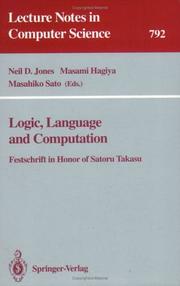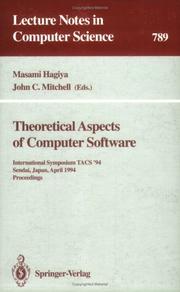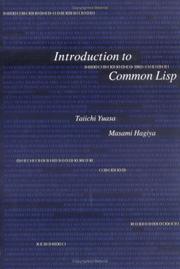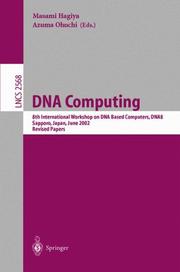| Listing 1 - 10 of 15 | << page >> |
Sort by
|
Digital
ISBN: 9783540334392 Year: 2006 Publisher: Berlin Heidelberg Springer-Verlag GmbH
Abstract | Keywords | Export | Availability | Bookmark
 Loading...
Loading...Choose an application
- Reference Manager
- EndNote
- RefWorks (Direct export to RefWorks)
Mathematical logic --- Computer science --- Programming --- Artificial intelligence. Robotics. Simulation. Graphics --- programmeren (informatica) --- programmeertalen --- wiskunde --- KI (kunstmatige intelligentie) --- logica --- robots --- AI (artificiële intelligentie)
Digital
ISBN: 9784431554295 Year: 2016 Publisher: Tokyo Springer Japan
Abstract | Keywords | Export | Availability | Bookmark
 Loading...
Loading...Choose an application
- Reference Manager
- EndNote
- RefWorks (Direct export to RefWorks)
This book highlights recent advances in natural computing, including biology and its theory, bio-inspired computing, computational aesthetics, computational models and theories, computing with natural media, philosophy of natural computing, and educational technology. It presents extended versions of the best papers selected from the “8th International Workshop on Natural Computing” (IWNC8), a symposium held in Hiroshima, Japan, in 2014. The target audience is not limited to researchers working in natural computing but also includes those active in biological engineering, fine/media art design, aesthetics, and philosophy.
Statistical science --- Mathematics --- Biomathematics. Biometry. Biostatistics --- Molecular biology --- Applied physical engineering --- Computer science --- Programming --- Artificial intelligence. Robotics. Simulation. Graphics --- Computer. Automation --- neuronale netwerken --- fuzzy logic --- cybernetica --- bio-informatica --- vormgeving --- computers --- informatica --- statistiek --- mineralen (chemie) --- simulaties --- mijnbouw --- biometrie --- informaticaonderzoek --- KI (kunstmatige intelligentie) --- ingenieurswetenschappen --- moleculaire biologie --- AI (artificiële intelligentie)
Digital
ISBN: 9784431551058 9784431551065 9784431551041 9784431561675 Year: 2015 Publisher: Tokyo Springer Japan
Abstract | Keywords | Export | Availability | Bookmark
 Loading...
Loading...Choose an application
- Reference Manager
- EndNote
- RefWorks (Direct export to RefWorks)
This book highlights recent advances in natural computing, including biology and its theory, bio-inspired computing, computational aesthetics, computational models and theories, computing with natural media, philosophy of natural computing and educational technology. It presents extended versions of the best papers selected from the symposium “7th International Workshop on Natural Computing” (IWNC7), held in Tokyo, Japan, in 2013. The target audience is not limited to researchers working in natural computing but also those active in biological engineering, fine/media art design, aesthetics and philosophy.
Statistical science --- Mathematics --- Biomathematics. Biometry. Biostatistics --- Molecular biology --- Computer science --- Programming --- Artificial intelligence. Robotics. Simulation. Graphics --- Computer. Automation --- neuronale netwerken --- fuzzy logic --- cybernetica --- bio-informatica --- vormgeving --- computers --- informatica --- statistiek --- mineralen (chemie) --- simulaties --- mijnbouw --- informaticaonderzoek --- KI (kunstmatige intelligentie) --- moleculaire biologie --- AI (artificiële intelligentie)

ISBN: 3540579354 0387579354 3540483918 9783540579359 Year: 1994 Volume: 792 Publisher: Berlin: Springer,
Abstract | Keywords | Export | Availability | Bookmark
 Loading...
Loading...Choose an application
- Reference Manager
- EndNote
- RefWorks (Direct export to RefWorks)
This volume contains 15 papers from research areas where Japanese theoretical computer science is particularly strong. Many are about logic, and its realization and applications to computer science; others concern synthesis, transformation and implementation of programming languages, and complexity and coding theory. Not coincidentally, all the authors are either former students or close colleagues of Satoru Takasu, professor and director at the Research Institute of Mathematical Sciences at the University of Kyoto. The purpose of this volume is to celebrate Professor Takasu's influence on theoretical computer science in Japan and worldwide by his research, his philosophy, and his advising of students. The breadth, depth and quality of the papers are characteristic of his interests and activities.
Computer science --- Informatica --- Informatique --- Computer Science --- Takasu, Satoru, --- Mathematical logic. --- Computers. --- Architecture, Computer. --- Computer logic. --- Programming languages (Electronic computers). --- Mathematical Logic and Formal Languages. --- Theory of Computation. --- Computer System Implementation. --- Logics and Meanings of Programs. --- Computation by Abstract Devices. --- Programming Languages, Compilers, Interpreters. --- Computer languages --- Computer program languages --- Computer programming languages --- Machine language --- Electronic data processing --- Languages, Artificial --- Computer science logic --- Logic, Symbolic and mathematical --- Architecture, Computer --- Automatic computers --- Automatic data processors --- Computer hardware --- Computing machines (Computers) --- Electronic brains --- Electronic calculating-machines --- Electronic computers --- Hardware, Computer --- Computer systems --- Cybernetics --- Machine theory --- Calculators --- Cyberspace --- Algebra of logic --- Logic, Universal --- Mathematical logic --- Symbolic and mathematical logic --- Symbolic logic --- Mathematics --- Algebra, Abstract --- Metamathematics --- Set theory --- Syllogism --- Langages formels --- Formal languages --- Computer science. --- Formal languages. --- Takasu, Satoru, - 1931 --- -Informatique --- Algorithmique --- Automates abstraits --- Complexite --- -Computer science --- -Computer Science --- Takasu, Satoru, - 1931-

ISBN: 0387578870 Year: 1994 Publisher: Berlin : Springer-Verlag,
Abstract | Keywords | Export | Availability | Bookmark
 Loading...
Loading...Choose an application
- Reference Manager
- EndNote
- RefWorks (Direct export to RefWorks)

ISBN: 0127748601 9780127748603 Year: 1987 Publisher: Boston: Academic press,
Abstract | Keywords | Export | Availability | Bookmark
 Loading...
Loading...Choose an application
- Reference Manager
- EndNote
- RefWorks (Direct export to RefWorks)
Book
ISBN: 9783540334392 Year: 2006 Publisher: Berlin Heidelberg Springer Berlin Heidelberg
Abstract | Keywords | Export | Availability | Bookmark
 Loading...
Loading...Choose an application
- Reference Manager
- EndNote
- RefWorks (Direct export to RefWorks)
This volume contains the proceedings of the 8th International Symposium on Functional and Logic Programming (FLOPS 2006), held in Fuji-Susono, Japan, April 24-26, 2006 at the Fuji Institute of Education and Training. FLOPS is a forum for research on all issues concerning functional progr- ming and logic programming. In particular it aims to stimulate the cro- fertilizationaswellastheintegrationofthetwoparadigms.ThepreviousFLOPS meetings took place in Fuji-Susono (1995), Shonan (1996), Kyoto (1998), Tsukuba (1999), Tokyo (2001), Aizu (2002) and Nara (2004). The proceedings of FLOPS 1999, FLOPS 2001, FLOPS 2002 and FLOPS 2004 were published by Springer in the Lecture Notes in Computer Science series, as volumes 1722, 2024, 2441 and 2998, respectively. In responseto the call for papers, 51 papers weresubmitted. Each paper was reviewed by at least three ProgramCommittee members with the help of expert external reviewers. The Program Committee meeting was conducted electro- cally for a period of 2 weeks in December 2005 and January 2006. After careful and thorough discussion, the Program Committee selected 17 papers (33%) for presentation at the conference. In addition to the 17 contributed papers, the symposium included talks by two invited speakers: Guy Steele (Sun Micros- tems Laboratories) and Peter Van Roy (Universit´ e Catholique de Louvain).
Mathematical logic --- Computer science --- Programming --- Artificial intelligence. Robotics. Simulation. Graphics --- programmeren (informatica) --- programmeertalen --- wiskunde --- KI (kunstmatige intelligentie) --- logica --- robots
Book
ISBN: 9784431551058 4431551042 9784431551041 1322173761 4431551050 Year: 2015 Publisher: Tokyo : Springer Japan : Imprint: Springer,
Abstract | Keywords | Export | Availability | Bookmark
 Loading...
Loading...Choose an application
- Reference Manager
- EndNote
- RefWorks (Direct export to RefWorks)
This book highlights recent advances in natural computing, including biology and its theory, bio-inspired computing, computational aesthetics, computational models and theories, computing with natural media, philosophy of natural computing and educational technology. It presents extended versions of the best papers selected from the symposium “7th International Workshop on Natural Computing” (IWNC7), held in Tokyo, Japan, in 2013. The target audience is not limited to researchers working in natural computing but also those active in biological engineering, fine/media art design, aesthetics and philosophy.
Engineering. --- Computational Intelligence. --- Simulation and Modeling. --- Computational Science and Engineering. --- Statistics and Computing/Statistics Programs. --- Computational Biology/Bioinformatics. --- Computer simulation. --- Bioinformatics. --- Computer science. --- Mathematical statistics. --- Ingénierie --- Simulation par ordinateur --- Bio-informatique --- Informatique --- Statistique mathématique --- Combinatorial optimization. --- Computing. --- Natural computation. --- Engineering & Applied Sciences --- Computer Science --- Biologically-inspired computing --- Bio-inspired computing --- Natural computing --- Computer mathematics. --- Statistics. --- Computational intelligence. --- Intelligence, Computational --- Artificial intelligence --- Statistical analysis --- Statistical data --- Statistical methods --- Statistical science --- Mathematics --- Econometrics --- Computer mathematics --- Discrete mathematics --- Electronic data processing --- Bio-informatics --- Biological informatics --- Biology --- Information science --- Computational biology --- Systems biology --- Computer modeling --- Computer models --- Modeling, Computer --- Models, Computer --- Simulation, Computer --- Electromechanical analogies --- Mathematical models --- Simulation methods --- Model-integrated computing --- Construction --- Industrial arts --- Technology --- Data processing --- Soft computing --- Bionics --- Statistical inference --- Statistics, Mathematical --- Statistics --- Probabilities --- Sampling (Statistics) --- Informatics --- Science --- Statistics .

ISBN: 3540005315 3540364404 Year: 2003 Publisher: Berlin, Heidelberg : Springer Berlin Heidelberg : Imprint: Springer,
Abstract | Keywords | Export | Availability | Bookmark
 Loading...
Loading...Choose an application
- Reference Manager
- EndNote
- RefWorks (Direct export to RefWorks)
Biomolecular computing has emerged as an interdisciplinary ?eld that draws - gether chemistry, computer science, mathematics, molecular biology, and physics. Our knowledge on DNA nanotechnology and biomolecular computing increases exponentially with every passing year. The international meeting on DNA Based Computers has been a forum where scientists with di?erent backgrounds, yet sharing a common interest in biomolecular computing, meet and present their latest results. Continuing this tradition, the 8th International Meeting on DNA Based Computers (DNA8) focuses on the current theoretical and experimental results with the greatest impact. Papers and poster presentations were sought in all areas that relate to b- molecular computing, including (but not restricted to): algorithms and appli- tions, analysis of laboratory techniques/theoretical models, computational p- cesses in vitro and in vivo, DNA-computing-based biotechnological applications, DNA devices, error evaluation and correction, in vitro evolution, models of biomolecular computing (using DNA and/or other molecules), molecular - sign, nucleic acid chemistry, and simulation tools. Papers and posters with new experimental results were particularly encouraged. Authors who wished their work to be considered for either oral or poster presentation were asked to select from one of two submission “tracks”: – Track A - Full Paper – Track B - One-Page Abstract For authors with late-breaking results, or who were submitting their manuscript to a scienti?c journal, a one-page abstract, rather than a full paper, could be submitted in Track B. Authors could (optionally) include a preprint of their full paper, for consideration only by the program committee.
Molecular computers --- Computer Science --- Engineering & Applied Sciences --- Mathematics. --- Computers. --- Algorithms. --- Artificial intelligence. --- Bioinformatics. --- Mathematical logic. --- Mathematical Logic and Foundations. --- Computation by Abstract Devices. --- Algorithm Analysis and Problem Complexity. --- Artificial Intelligence (incl. Robotics). --- Algebra of logic --- Logic, Universal --- Mathematical logic --- Symbolic and mathematical logic --- Symbolic logic --- Mathematics --- Algebra, Abstract --- Metamathematics --- Set theory --- Syllogism --- Bio-informatics --- Biological informatics --- Biology --- Information science --- Computational biology --- Systems biology --- AI (Artificial intelligence) --- Artificial thinking --- Electronic brains --- Intellectronics --- Intelligence, Artificial --- Intelligent machines --- Machine intelligence --- Thinking, Artificial --- Bionics --- Cognitive science --- Digital computer simulation --- Electronic data processing --- Logic machines --- Machine theory --- Self-organizing systems --- Simulation methods --- Fifth generation computers --- Neural computers --- Algorism --- Algebra --- Arithmetic --- Automatic computers --- Automatic data processors --- Computer hardware --- Computing machines (Computers) --- Electronic calculating-machines --- Electronic computers --- Hardware, Computer --- Computer systems --- Cybernetics --- Calculators --- Cyberspace --- Math --- Science --- Data processing --- Foundations --- Logic, Symbolic and mathematical. --- Computer science. --- Computer software. --- Artificial Intelligence. --- Software, Computer --- Informatics
Book
ISBN: 4431554289 4431554297 Year: 2016 Publisher: Tokyo : Springer Japan : Imprint: Springer,
Abstract | Keywords | Export | Availability | Bookmark
 Loading...
Loading...Choose an application
- Reference Manager
- EndNote
- RefWorks (Direct export to RefWorks)
This book highlights recent advances in natural computing, including biology and its theory, bio-inspired computing, computational aesthetics, computational models and theories, computing with natural media, philosophy of natural computing, and educational technology. It presents extended versions of the best papers selected from the “8th International Workshop on Natural Computing” (IWNC8), a symposium held in Hiroshima, Japan, in 2014. The target audience is not limited to researchers working in natural computing but also includes those active in biological engineering, fine/media art design, aesthetics, and philosophy.
Natural computation -- Congresses. --- Engineering & Applied Sciences --- Computer Science --- Natural computation --- Biologically-inspired computing --- Bio-inspired computing --- Natural computing --- Engineering. --- Computer simulation. --- Bioinformatics. --- Computer mathematics. --- Statistics. --- Computational intelligence. --- Computational Intelligence. --- Simulation and Modeling. --- Computational Science and Engineering. --- Statistics and Computing/Statistics Programs. --- Computational Biology/Bioinformatics. --- Intelligence, Computational --- Artificial intelligence --- Statistical analysis --- Statistical data --- Statistical methods --- Statistical science --- Mathematics --- Econometrics --- Computer mathematics --- Discrete mathematics --- Electronic data processing --- Bio-informatics --- Biological informatics --- Biology --- Information science --- Computational biology --- Systems biology --- Computer modeling --- Computer models --- Modeling, Computer --- Models, Computer --- Simulation, Computer --- Electromechanical analogies --- Mathematical models --- Simulation methods --- Model-integrated computing --- Construction --- Industrial arts --- Technology --- Data processing --- Soft computing --- Bionics --- Computer science. --- Mathematical statistics. --- Statistical inference --- Statistics, Mathematical --- Statistics --- Probabilities --- Sampling (Statistics) --- Informatics --- Science --- Statistics .
| Listing 1 - 10 of 15 | << page >> |
Sort by
|

 Search
Search Feedback
Feedback About UniCat
About UniCat  Help
Help News
News